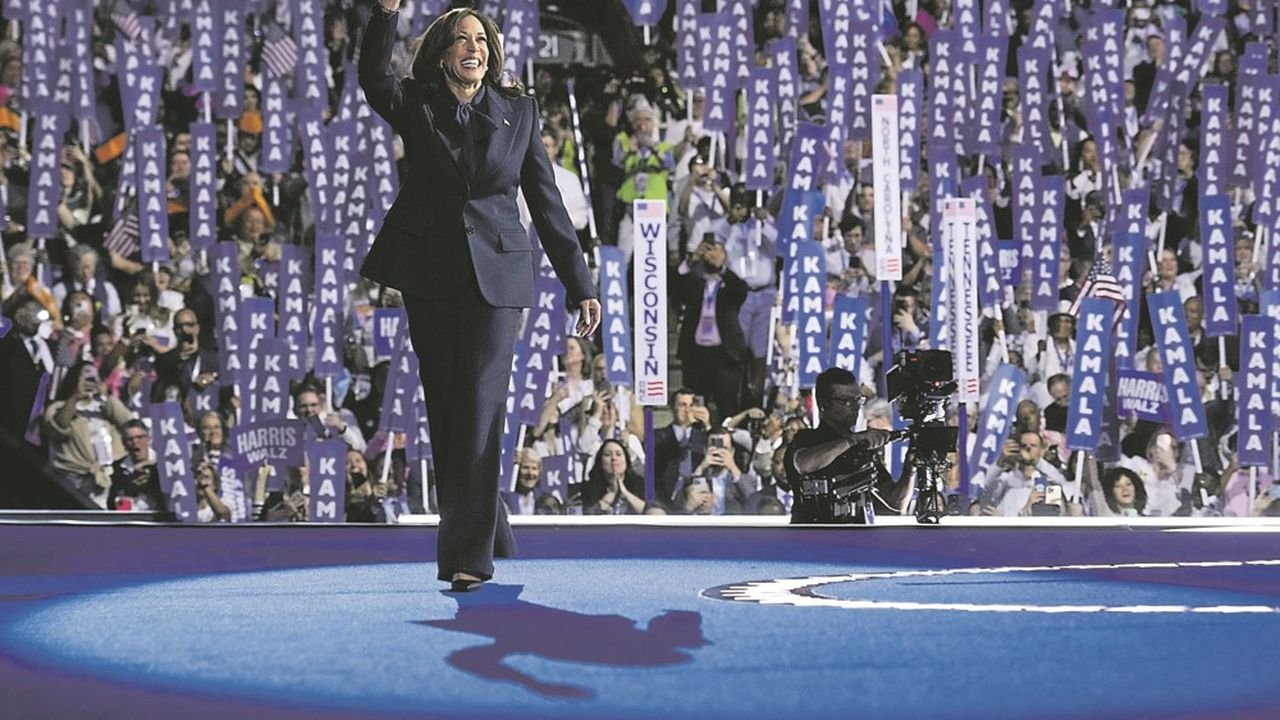By Dominique Moïsi (geopolitical scientist, special adviser to the Institut Montaigne.)
“Trump will be re-elected president of the United States and Russia will impose its peace terms on Ukraine. “It was July 20 last year. Right on the eve of Joe Biden’s decision not to run again. My interlocutor, who summarized his thoughts for me in this way, is a very high-ranking officer in the French army. It only reflected the consensus that may have existed at the beginning of the summer among the French and no doubt the world elite.
This double resignation is no longer on the agenda. In the space of a short month, hope has changed sides. Wouldn’t it be more accurate to say that hope returns? By withdrawing very late from the race for the White House, Joe Biden openly chose Kamala Harris. There was no time to organize a real campaign within the Democratic Party.
The images from the Democratic National Convention in Chicago are of course reminiscent of those from 2008, but perhaps with one significant difference. Barack Obama was more aristocratic and distant. Kamala Harris is warmer, happier above all. Is this relief after the fear of disaster predicted if Biden maintained his candidacy? Enthusiasm is even greater among Democrats in 2024 than in 2008.
Positive nationalism
Like Obama before her, Harris is campaigning on hope. She has played with talent so far on positive emotions, at a time when her rival is apocalyptically announcing the third world war (if, of course, he is not re-elected). Negative sentiment may reflect America’s recent developments, but they are at odds with its optimistic fundamentals.
If it wins, as seems possible (but three months is an eternity in politics), the Democratic Party will have demonstrated that positive and moderate nationalism based on moral clarity is the best answer to populism. “Have confidence in yourself and in your values” says Kamala Harris and responds to Donald Trump’s: “Be afraid of everything and especially of the Other”.
By electing Tim Walz, the governor of Minnesota, Kamala Harris is challenging Donald Trump for his virtual monopoly on the blue-collar vote. A reassuring, warm, popular personality in the best sense of the word, Walz can also attract a more rural electorate, which the Democrats risked being sorely lacking.
Democratic dynamics
But isn’t the strength of the Harris-Walz duo mainly due to the limits of the Trump-Vance ticket, with the latter amplifying the weaknesses of the former? As long as the Democratic Party candidates were Biden-Harris, the election of Vance, a loudmouth who was particularly extremist in his views (especially on abortion), could be justified.
Today, Kamala Harris’ choice of Tim Walz, conversely, only highlights JD Vance’s radicalism, if not the anachronistic machismo. Galvanized by Michelle Obama, women can only mobilize massively, just like young people.
Bad loser in 2020, wouldn’t Donald Trump be a bad candidate in 2024? Once the obstacle that might have been posed by Justice, too sure of himself and his inevitable revenge on Biden, is eliminated, Trump seems to have a hard time being anything but his caricature. Certainly, nothing is settled in such a polarized America. And the Democratic Party must be careful not to place too much emphasis on the identity card. But the dynamic has undoubtedly shifted to the democratic side.
Ukrainian surprise
On the war front in Ukraine, nothing has been decided either. But by taking the fighting deep into Russian territory and capturing more than 100 localities, Kiev scored points over Moscow. The surprise effect appears to have been total. By creating (for how long?) a buffer zone on its borders, Ukraine has once again demonstrated that the little Ukrainian David could balance, if not destabilize, the Russian Goliath.
For the first time since the end of World War II, fighting is taking place in Russia itself. Hundreds of thousands of Russian populations have to seek refuge further inside their territories. A special military operation that was supposed to quickly bring Ukraine to its knees is starting to look like a disaster that only highlights the weaknesses of Putin’s Russia and especially the weaknesses of the army.
The Ukrainians are too realistic to claim victory (and the Russians continue to make significant advances in Donbass). But these temporarily conquered areas have, in addition to their strategic value, a double potential utility value. To serve as a bargaining chip tomorrow as part of a negotiation that will eventually be held. And, on a more psychological level, get the fatigue to switch sides.
Putin’s embarrassment
Since the start of the conflict, Moscow has counted on the fatigue of Westerners first and then Ukrainians. What if the Russians got tired of the war before the Ukrainians? What if the Russian security services grew tired of Putin, of his excessive risk-taking, if not of his ideological excesses? Opening Russia to foreigners fleeing the West’s “destructive neoliberal” ideology, as the Kremlin’s master has just generously announced, is one thing. Guaranteeing the security of Russian territories against Ukrainian “terrorists” is another.
Putin confidently awaited Donald Trump’s victory in the United States. That of Kamala Harris would be a source of embarrassment for him. In her closing speech at the Democratic Convention in Chicago, Kamala clearly opposed anyone who “makes friends with dictators.” Furthermore, at a time when Moscow intends to play on the anger of the “global south” against the West, the arrival at the head of the leading Western and world power of a woman who is both black and Indian could muddy the waters.
The victory for the Harris/Walz ticket in the United States will certainly not be Ukraine’s. But victory with the Trump/Vance ticket would be seen as a defeat for Kiev. Trump’s America would not necessarily abandon Ukraine, but would not show the same loyalty, the same empathy towards the Ukrainians as Biden’s America yesterday (and Harris tomorrow). What if there was hope from Washington to Kiev?
Dominique Moïsi is a geopolitical scientist.
